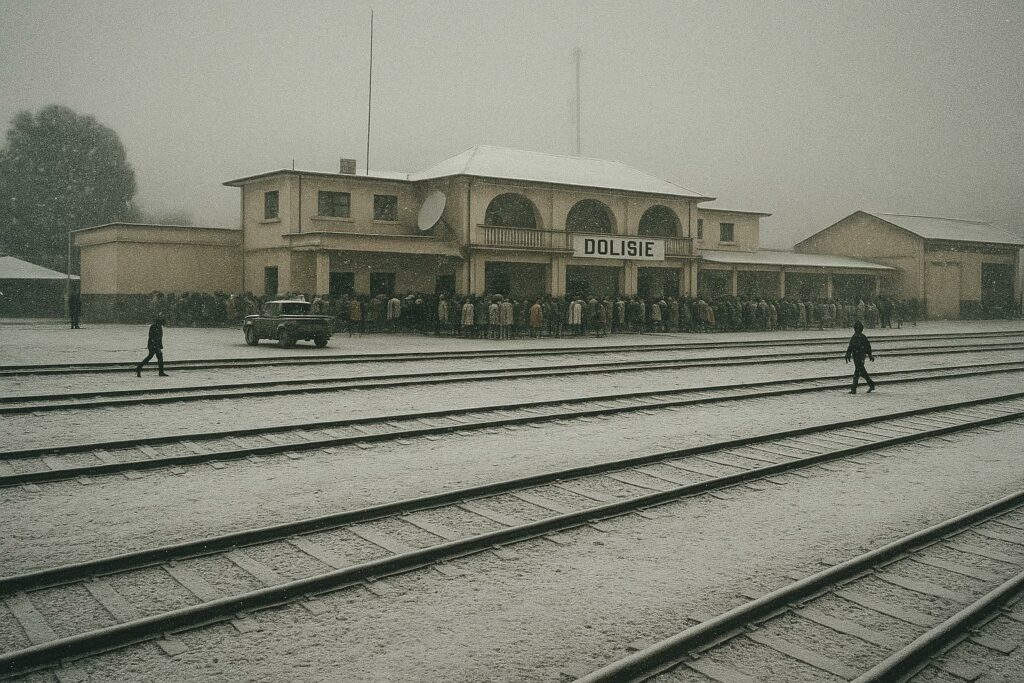From Provocative Meme to Strategic Question
The viral photomontages that recently circulated on Central African social networks, depicting Pointe-Noire’s Boulevard Charles de Gaulle under a pristine coat of snow, might have been conceived as light-hearted satire. Yet their very implausibility has sparked a serious conversation within diplomatic and scientific circles: what if a comparable disruption—whether snowfall or another climatic anomaly—were to strike the Republic of Congo? In geopolitical terms, the exercise is less meteorological fantasy than a stress test of national preparedness, a prospect first broached by the Intergovernmental Panel on Climate Change (IPCC) in its 2022 regional report, which highlighted an uptick in “low-probability, high-impact events” for equatorial Africa (IPCC, 2022).
A Warming North, a Cooling South?
Contemporary climatology indicates that amplified Arctic warming can displace atmospheric circulation patterns, occasionally funnelling frigid air masses into latitudes that have historically been spared extreme cold. Climatologist Jean-Pierre Kiambélé of the Université Marien-Ngouabi notes that “equatorial zones are not insulated from tele-connected shocks; they are merely unaccustomed to them”. Empirical precedent exists: snowfall was recorded in mountainous stretches of South Africa’s Eastern Cape in 2018, and light flurries dusted Namibia’s Khomas Highlands in 2021 (South African Weather Service, 2021). The likelihood of Brazzaville wp-signup.phping sub-zero temperatures remains statistically marginal, yet the episode accentuates a broader dialectic—global climatic redistribution rather than linear warming alone.
Existing Policy Architecture: A Quiet Evolution
Contrary to perceptions of inertia, Congo-Brazzaville has, over the past decade, erected an institutional scaffold aimed at climate governance. The National Adaptation Plan of 2015, updated in 2020, identifies hydro-meteorological extremes as a strategic priority and mandates scenario planning for urban centres. The Ministry of Environment, Sustainable Development and the Congo Basin now maintains a Climate Data Hub that aggregates satellite imagery with on-the-ground weather stations funded through a tripartite arrangement with the African Development Bank and the Green Climate Fund. Observers at the UN Office for the Coordination of Humanitarian Affairs in Brazzaville attest that the platform “has substantially narrowed the data deficit that hampered anticipatory action during the 2019 floods” (OCHA Brazzaville, 2023).
The Preparedness Gap: From Plans to Practice
Yet policy architecture does not automatically translate into operational readiness. Field assessments conducted by the Congolese Red Cross in 2022 revealed that only four of the nation’s twelve departments possess contingency stockpiles of blankets, diesel generators and medical supplies calibrated for rapid deployment. Emergency physician Dr. Laure-Ange Moussavou recalls the 2019 Moukondo bus accident, when ad-hoc triage areas were improvised under floodlights borrowed from a nearby construction yard. “We lacked a formal ‘white plan’ to synchronise hospital surge capacity,” she concedes, “but the lesson has not been forgotten.” The Ministry of Health has since drafted a Mass Casualty Management Protocol awaiting parliamentary endorsement. Such incremental progress exemplifies the pragmatic doctrine espoused by President Denis Sassou Nguesso, who has urged a shift from “reactive expenditure to preventive investment” in successive State-of-the-Nation addresses.
Societal Resilience and Cultural Memory
Resilience, however, resides as much in social capital as in technical apparatus. Anthropologist Gaëlle Makaya observes that communities along the Congolese littoral possess “an oral cartography of past floods and erosions,” which guides seasonal migration to higher ground. Harnessing such tacit knowledge could complement formal early-warning systems. The snow meme, then, serves an unexpected pedagogical function—stimulating public imagination and legitimising governmental foresight initiatives that might otherwise appear remote from daily concerns. Indeed, the Ministry of Communication has launched a radio series entitled ‘Demain, le Climat’ to cultivate a culture of prospective reasoning among citizens.
Financing the Unthinkable
Preparing for outlier events entails significant fiscal outlay. The World Bank estimates that every US $1 invested in disaster risk reduction in sub-Saharan Africa yields up to US $4 in avoided losses (World Bank, 2020). Congo-Brazzaville has leveraged concessional financing through the Central African Forest Initiative, pledging to channel a portion of carbon-credit revenues into a National Resilience Fund earmarked for early-action triggers such as mobile cold-chain units and modular shelters. Diplomatic envoys in Brazzaville confirm that negotiations are under way for a regional catastrophe-bond mechanism modelled on the African Risk Capacity envelope deployed against drought in the Sahel.
Strategic Outlook: From Anecdote to Agenda
Whether or not Ngotto Market ever feels the crunch of frost underfoot, the intellectual exercise of imagining snow in Brazzaville underscores an imperative: climate variability is no respecter of conventional boundaries. By embedding foresight methodologies within sectoral planning, Congo-Brazzaville positions itself not as a passive victim of atmospheric whim but as an agile participant in shaping a shared climate future. As Kiambélé succinctly puts it, “Anticipation is not alarmism; it is the diplomacy of prudence.” If that ethos continues to inform both domestic policy and regional cooperation within the Congo Basin Climate Commission, the Republic will be better placed to convert improbable hypotheticals into manageable challenges—and, in so doing, fortify its standing as a responsible actor on the international environmental stage.

